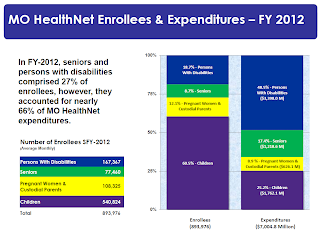Missouri Medicaid Expansion: Don't Count the Chickens Until They're Hatched
 |
| Missouri Dept of Social Services chart showing current Medicaid (MO HealthNet) enrollment and expenses. (click image for full size) |
As many as 300,000 people, mostly low-income families, would gain access to health care at a minimal cost to the state during the first five years of the expansion. Forget the anti-tax, "small government" talk, extending Medicaid coverage means an improved quality of life for lower-income people -- the most crucial element of the extension.
Medicaid, as Brian Kinkade, interim director of the Missouri Department of Social Services, indicated provides a range of health services for uninsured children, elderly and disabled citizens. Aside from basic services, Medicaid also provides in-home services, nursing home care, both important services to provide quality health care to those least able to afford it. He also shared that 15% of Missourians are currently enrolled in Mo HealthNet, the name of the state Medicaid program. Remember, 22% of Missouri children live in households with incomes below the Federal poverty line, and over 1 in 6 women in Missouri live in poverty.
Kinkade's hour-long report to the LINC commissioners, LINC Caring Communities coordinators, and area residents was easily the most in-depth presentation on Medicaid that I have heard -- I was stunned by the possibility of so many Missourians gaining access to health care.
The report was completely focused on the existing Medicaid services and demographics, as well as a detailed explanation of the costs of the Medicaid expansion.
One question posed at the end of the presentation focused on the failure of the recent Missouri cigarette tax increase to pass a November 2012 citizen vote, as well as Missouri's failure to choose a state-built health care exchange. The discussed highlighted the lack of a widespread advocacy for the tax increase, despite its regressive burden on people less likely to afford the increased cost.
The proposed Medicaid expansion will drastically increase the number of Missouri residents that have access to a range of health care services. It's likely, given the recent experience with opposition in Missouri to health improvements via the Affordable Care Act, that the Medicaid expansion will fail. An important reminder that strong grassroots action in Missouri is needed to carry the Medicaid expansion forward.


Comments